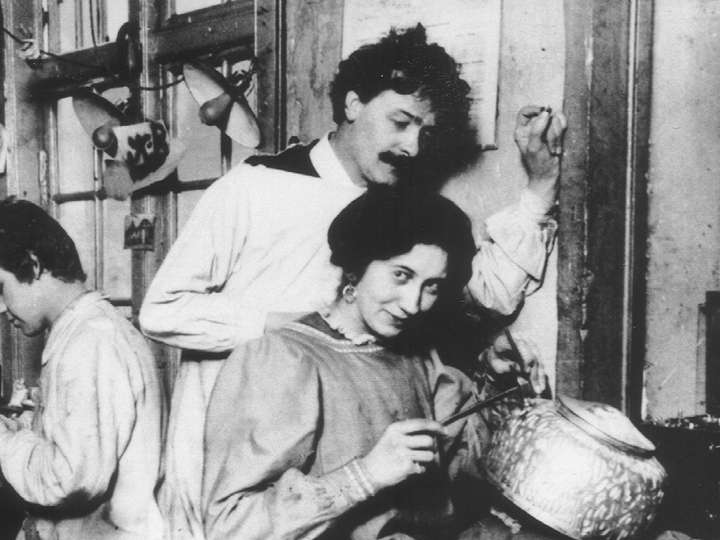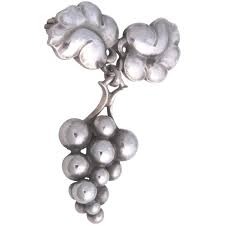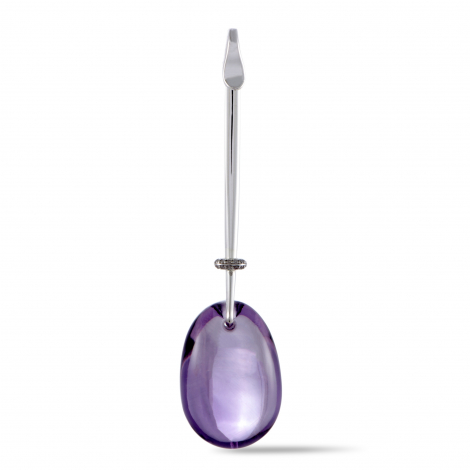Georg Jensen
History of Georg Jensen
Georg Jensen is a brand that has a long history of quality, beauty, and innovation in the sterling silver world. They’ve been existence since 1904, when they were founded by the Danish silversmith and artist Georg Jensen. Their workshop in Copenhagen, Denmark produces jewelry, table and bar ware, wine accessories, cutlery, and home décor in a high class and beautiful manner regarded as some of the best across the world.

Georg Jensen actually began as a ceramicist, while also dabbling in art, sculpture, and goldsmith work all at the age of 14. He was already well known in the community before he even began the sterling silver brand, and truly possessed a talent for the art, and an eye for design. The brand started with custom sterling silver jewelry, then expanded into the iconic, hollow silverware pieces that are highly coveted.
The brand is known for incredible collaborations, working with designers from the early 1900s onward to design collections you can still purchase today. For the past 12 years, the company has been located in an old royal porcelain factory, and has skilled silversmiths hand making the pieces rather than a factory style production. In addition to silver, they also are exceptional at producing stainless, Polish steel pieces, adding versatility to the brand. Whether it’s to wear or to serve, a Georg Jensen silverware piece carries the same air of classic heritage.
While the brand is available for sale, it also is housed in a variety of museum collections, like the Danish Museum and the Bard, particularly the rare and original pieces. Over the one hundred plus years, they’ve had 10 different distinct logos indicating authenticity. Georg Jensen took sterling silver and made it into an art, drawing collectors and enthusiasts from all over the globe.
Investment and Price Range
Georg Jensen is well worth the investment. Each piece is handmade by one of their 25 silversmiths, and they may spend up to six months hammering and perfecting the piece! That is commitment, and takes years of skill and knowledge to even get to this point! Each piece is the project of an individual person, so from start to finish, your piece will be made with care and a personal touch, rather than in a factory line process. With the personal attention to detail, you get to know the craftsman, not the machine.
A typical piece will cost anywhere from $40 and up depending on where you purchase, and what you’re grabbing. Some sale house wear items are low, but some of the lavish, custom made pieces run in the hundreds. While silverware can run lower, a high performing vase that took six months to make is much more expensive. It all depends on how rare the item is, and the amount of time it took to handcraft the piece. Regardless of price, the pieces are luxurious and look and feel expensive, with great weight and shine, as well as an extraordinarily long lifespan.
Key Styles and Collaborations
Zaha Hadid
Famed architect and designer Zaha Hadid unexpectedly passed in 2016, but just a few months prior, they released a collaboration inspired by her Galaxy Soho Complex in Beijing. These cuff rings and bracelets are truly one of a kind, and highlight both her and Georg Jensen’s love of naturally inspired lines and silhouettes. The collection came together effortlessly and seamlessly. The organic shapes of her buildings carried through in the jewelry as well, particularly in the cuffs and rings, often described as having a “sensuous, free flow.” Bringing both old and modern, the coveted jewelry is considered to be a fashion marvel.

Torun Bangle and Vivianna Torun Bulow-Hube
While the hollow silverware is a classic of the brand, jewelry designed are also iconic and memorable, such as the Torun Bangle. It is a classic and modern design by Vivianna Torun Bulow-Hube, a minimalist designer who brought her personal flare to her designs wherever she went. The bracelet is seen as an icon of togetherness and an expression of love. Other iconic pieces in this collaboration include the Vivianna Bangle watch, an unconnected bangle watch that allows you to be unrestricted by time, living life freely rather than bound or fully entrapped by time.

Moonlight Grapes
One of the most extensive Georg Jensen jewelry ranges is the Moonlight Grapes, a classic and original inspired collection. The Art Nouveau style is reinterpreted and modernized in the pieces, with earrings, rings, bracelets, and necklaces. The grapes and branches design originate from the early 1900s, and reflects Georg Jensen’s love of nature and structure. This line is perfect for the modern woman who is confident and loves the perfection of natural forms.

Performance and Care
Georg Jensen is worth the hype, particularly for their high performing materials and designs. With the attention to detail and the impeccable quality of sterling silver, you can’t ask for much more in the metalsmith world. With proper care, these pieces will last forever and can be passed down to others in future generations. They may even look just like they’re brand new. Whether it’s jewelry, a vase, or flatware, give your sterling silver the care it deserves with the proper strategy, products, and techniques.
Sterling silver is soft and can scratch easily, so being careful and mindful is key. In addition to storing pieces in their accompanying storage bags, a hand polish with a soft cloth can bring sterling silver right back up to its luster and shine. You can also use a special silver polish to give it a strong and beneficial shine. When polishing, make sure to follow the lines of the piece rather than just going from top to bottom. As you follow these lines and polish over time, the piece will increase in shine over the years, making your investment pay off! Make sure to wear gloves when tending to your pieces so they stay fingerprint free and don’t tarnish!
Historical Aside
In 1918, Georg Jensen designed the Tureen 270, a one-off piece with exquisite materials and designs that embodied his style and success of the time. The piece features intricate details on the base, body, and lid, coming together harmoniously. The piece is classic Art Nouveau with the ornamental touches and ode to nature, but the original piece’s whereabouts are unknown. While mysterious, the sketches were found in his original papers, allowing the magical botanical piece to return. Now, the brand has brought this piece back to life, over 100 years later, and is coveted by art collectors and silver lovers alike.
This piece takes over 1000 hours to craft, using chiseling, hand-hammering, and oxidation, as well as 128 handmade castings in the workshop. The process is used to capture the botanical leaves, poppies, bellflowers, and magnolias, and isn’t for the beginner silversmith. This vase is not only a piece of silver, but of heritage and art, relevant across a century.

Style
Georg Jensen has been appreciated by many during their long history, and were founded during the Art Nouveau era. One of the iconic pieces was the second, hollow silverware crafted by Georg, the Blossom Teapot, that is distinctly Scandinavian and unique while still following the Art Nouveau trend. It isn’t too complicated, rather, their work is humble and references nature. Traditionally, the Art Nouveau era was a reaction against academic art, bringing dynamic lines, natural curves, and inspiration from the natural world.
The work also spans the Art Deco movement, especially with their Pyramid silverware line that is inspired by Egyptian artifacts, with modern, strict lines. Art Deco began just before World War 1, and highlighted bold, geometric forms, an opposite of the previous art waves.

Their modernist vision was strong and propelled them throughout the decades, and the brand is still seen as modern today, which began just after World War 2. Curvaceous, Pregnant Duck, pitchers are a collector’s piece and an icon of their 20th century design. Modern designs were sleek and less loud than the previous Art Deco styles, though now, their revival pieces throwback to beginning styles.

Social Commitment
In addition to beauty, Georg Jensen carries a social commitment. They have their silversmiths working individually on each project, and avoid the idea of mass production, unfair labor, or factories all together. They also are members of the UN’s Global Compact, which emphasizes human rights, labor rights, and environmental protection, as well as the fight against corruption. As members of this pact, they comply with international standards with the purchasing of materials, upholding their responsibility to the earth, and its people.

